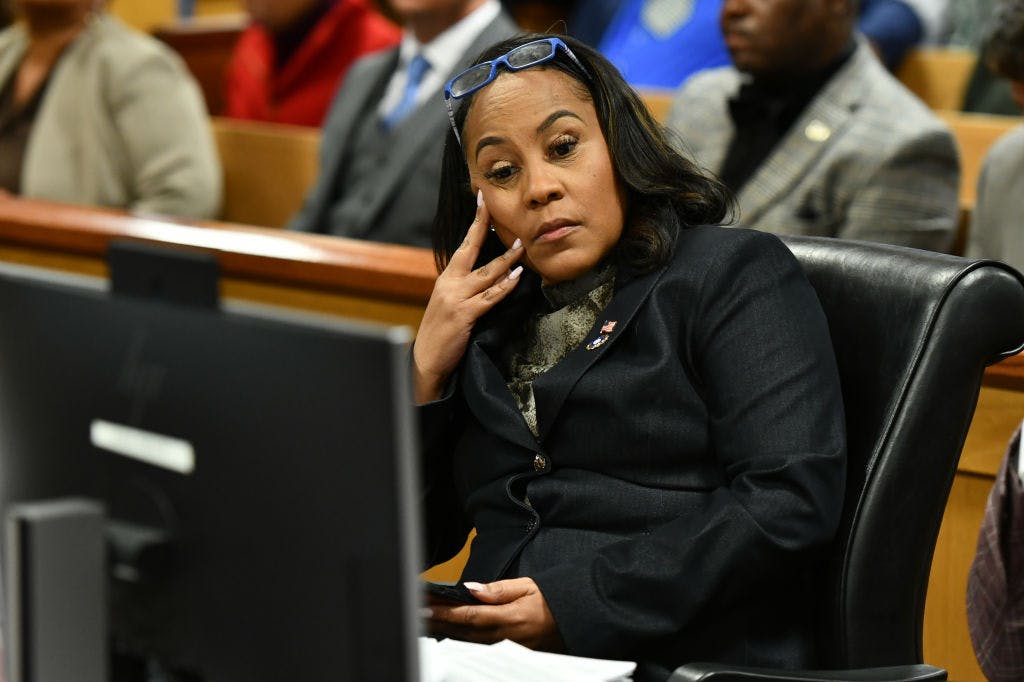Fani Willis Faces Another Defeat as Her Bid To Jail Young Thug for X Posts Is Denied
A judge orders the rapper to ‘exercise restraint’ but declines to send him back behind bars.

The district attorney of Georgia’s Fulton County, Fani Willis, was dealt another defeat in court when Judge Paige Whitaker denied her bid to revoke probation for the rapper Young Thug, whose real name is Jeffrey Williams. Ms. Willis alleged that his record label, YSL, doubled as a criminal gang.
Williams could have faced two decades behind bars if Judge Whitaker, the third presiding jurist — the first two were forced to recuse themselves — in a racketeering case that was the longest-running trial in Georgia’s history, determined that he violated the terms of the deal he reached with prosecutors. The musician pleaded guilty to gun, drug, and gang charges.
Judge Whitaker reasoned: “While the Court does not find that the cited social media post rises to the level of a violation of Defendant’s probation, it may be prudent for Defendant to exercise restraint regarding certain topics.”
Ms. Willis, though, argued that Williams “presents a clear and present danger to public safety and undermines the rule of law” because he reposted on X a video that alleged that “Marissa Viverito is the biggest liar in the DA’s office.” Ms. Viverito is a gang investigator in Ms. Willis’s office who testified during Williams’s trial. Of the six defendants who did not reach accords with the government, two were acquitted — a disappointing result for the district attorney.
Judge Whitaker barred video of her testimony, but a bootleg copy appears to have been leaked along with the caption: “She doesn’t want to be shown on screen? Well, here she is.” Another user posted an image of what appears to be Ms. Viverito’s mother’s house that was captioned: “If the hate is really real then pull up on her mama crib.” Another message reposted by Williams read “all my homies hate Viverito.”

Williams’s lawyers argued that “there is no violation of Williams’ probation by reposting an image on social media and opining that Investigator Viverito is untruthful.” The rapper’s sentence was “non-negotiated,” meaning that his sentence was entirely up to Judge Whitaker. If Williams was convicted on all charges, he could have faced more than a century in prison.
Williams, though, posted to his own account: “I don’t make threats to people I’m a good person, I would never condone anyone threatening anyone or definitely participate in threatening anyone. I’m all about peace and love.” Yet Ms. Willis accused him of engaging “in conduct that directly threatens the safety of witnesses and prosecutors, compromises ongoing legal proceedings, and warrants immediate revocation of probation.”
That argument was not enough to sway Judge Whitaker, and amounted to the latest setback in court for Ms. Willis, who won re-election in November in a rout. In December, she was disqualified by the Georgia court of appeals from another racketeering case, this one against President Trump and 18 others for election interference with respect to the 2020 presidential election. The appellate court marked that as “the rare case in which disqualification is mandated and no other remedy will suffice to restore public confidence in the integrity of these proceedings.”
That disqualification was on account of her secret romantic affair with her special prosecutor in the case, Nathan Wade. Both the trial judge, Scott McAfee, and the appellate court determined that the relationship between the two amounted to a “significant appearance of impropriety.” Judge McAfee also found that the affair, which involved trips to destinations like Napa Valley, Aruba, and Belize, emitted an “odor of mendacity.”
Ms. Willis is appealing her disqualification to the Georgia supreme court. In the meanwhile, she has in two separate lawsuits — one brought by a defendant in the election interference case, and another by the conservative legal organization Judicial Watch — charging she violated her duties under Georgia’s open records laws. Her office — meaning Fulton County taxpayers — was ordered to pay some $80,000 in attorneys’ fees across both cases.
Ms. Willis has also failed thus far to quash a subpoena issued by the Georgia state senate, which is seeking to compel her testimony on the prosecution of Mr. Trump. The judge presiding over that matter, Shukura Ingram, called Ms. Willis’s arguments for quashing “absurd.”

